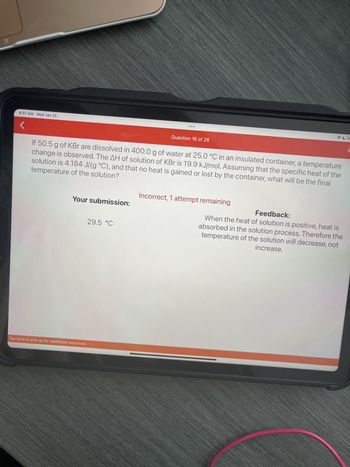If 50.5 g of KBr are dissolved in 400.0 g of water at 25.0 °C in an insulated container, a temperature change is observed. The AH of solution of KBr is 19.9 kJ/mol. Assuming that the specific heat of the solution is 4.184 J/(g °C), and that no heat is gained or lost by the container, what will be the final temperature of the solution?
If 50.5 g of KBr are dissolved in 400.0 g of water at 25.0 °C in an insulated container, a temperature change is observed. The AH of solution of KBr is 19.9 kJ/mol. Assuming that the specific heat of the solution is 4.184 J/(g °C), and that no heat is gained or lost by the container, what will be the final temperature of the solution?
Chemistry
10th Edition
ISBN:9781305957404
Author:Steven S. Zumdahl, Susan A. Zumdahl, Donald J. DeCoste
Publisher:Steven S. Zumdahl, Susan A. Zumdahl, Donald J. DeCoste
Chapter1: Chemical Foundations
Section: Chapter Questions
Problem 1RQ: Define and explain the differences between the following terms. a. law and theory b. theory and...
Related questions
Question

Transcribed Image Text:esc
W
Н
H: | PF | Pr | HGwGwGta WHGW (3 il MOC2 |O|A|
app.101edu.co
Week 4 Lab 3....docx
If 50.5 g of KBr are dissolved in 400.0 g of water at 25.0 °C in an
insulated container, a temperature change is observed. The AH of
solution of KBr is 19.9 kJ/mol. Assuming that the specific heat of the
solution is 4.184 J/(g °C), and that no heat is gained or lost by the
container, what will be the final temperature of the solution?
1
F1
Q
2
F2
W
3
20
F3
W
E
की व
4
000
DOO
F4
R
do L
%
5
F5
Question 16 of 28
MacBook Air
T
6
F6
&
Y
7
F7
U
DII
8
FB
Expert Solution
This question has been solved!
Explore an expertly crafted, step-by-step solution for a thorough understanding of key concepts.
This is a popular solution!
Trending now
This is a popular solution!
Step by step
Solved in 5 steps

Follow-up Questions
Read through expert solutions to related follow-up questions below.
Follow-up Question

Transcribed Image Text:8:57 AM Wed Jan 25
If 50.5 g of KBr are dissolved in 400.0 g of water at 25.0 °C in an insulated container, a temperature
temperature of the solution?
change is observed. The AH of solution of KBr is 19.9 kJ/mol. Assuming that the specific heat of the
solution is 4.184 J/(g °C), and that no heat is gained or lost by the container, what will be the final
Your submission:
Tap here or pull up for additional resources
Question 16 of 28
29.5 °C
Incorrect, 1 attempt remaining
Feedback:
When the heat of solution is positive, heat is
absorbed in the solution process. Therefore the
temperature of the solution will decrease, not
increase.
83
Solution
Recommended textbooks for you

Chemistry
Chemistry
ISBN:
9781305957404
Author:
Steven S. Zumdahl, Susan A. Zumdahl, Donald J. DeCoste
Publisher:
Cengage Learning

Chemistry
Chemistry
ISBN:
9781259911156
Author:
Raymond Chang Dr., Jason Overby Professor
Publisher:
McGraw-Hill Education

Principles of Instrumental Analysis
Chemistry
ISBN:
9781305577213
Author:
Douglas A. Skoog, F. James Holler, Stanley R. Crouch
Publisher:
Cengage Learning

Chemistry
Chemistry
ISBN:
9781305957404
Author:
Steven S. Zumdahl, Susan A. Zumdahl, Donald J. DeCoste
Publisher:
Cengage Learning

Chemistry
Chemistry
ISBN:
9781259911156
Author:
Raymond Chang Dr., Jason Overby Professor
Publisher:
McGraw-Hill Education

Principles of Instrumental Analysis
Chemistry
ISBN:
9781305577213
Author:
Douglas A. Skoog, F. James Holler, Stanley R. Crouch
Publisher:
Cengage Learning

Organic Chemistry
Chemistry
ISBN:
9780078021558
Author:
Janice Gorzynski Smith Dr.
Publisher:
McGraw-Hill Education

Chemistry: Principles and Reactions
Chemistry
ISBN:
9781305079373
Author:
William L. Masterton, Cecile N. Hurley
Publisher:
Cengage Learning

Elementary Principles of Chemical Processes, Bind…
Chemistry
ISBN:
9781118431221
Author:
Richard M. Felder, Ronald W. Rousseau, Lisa G. Bullard
Publisher:
WILEY